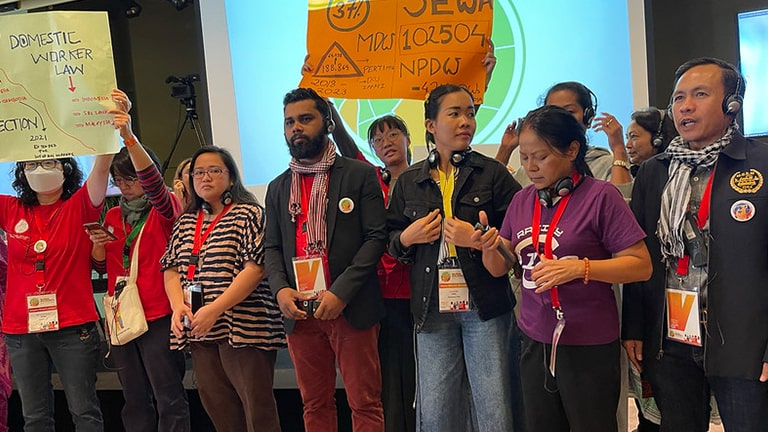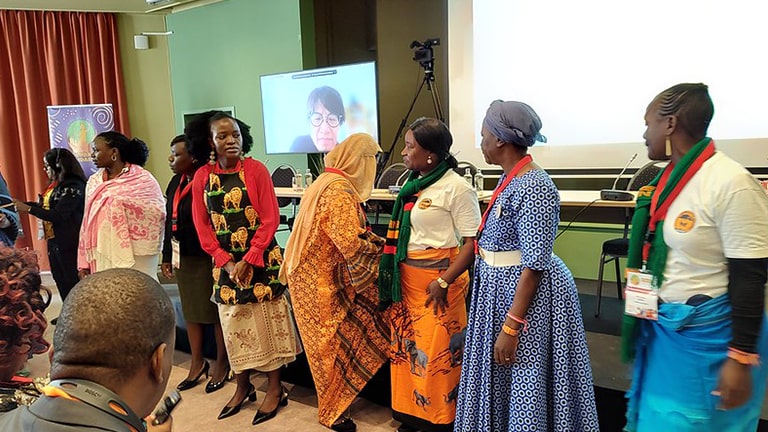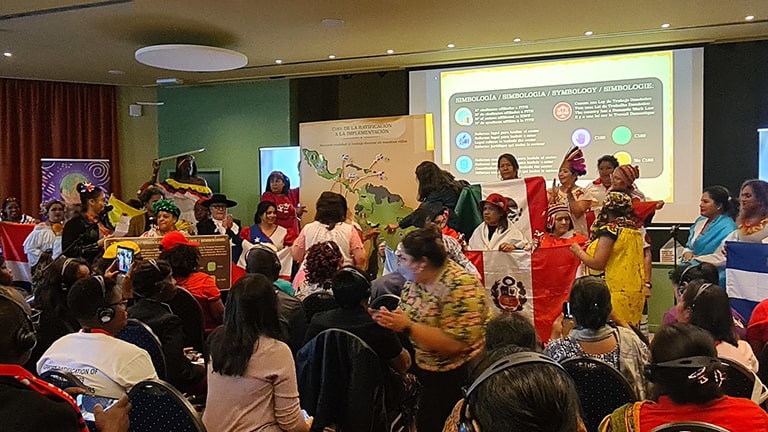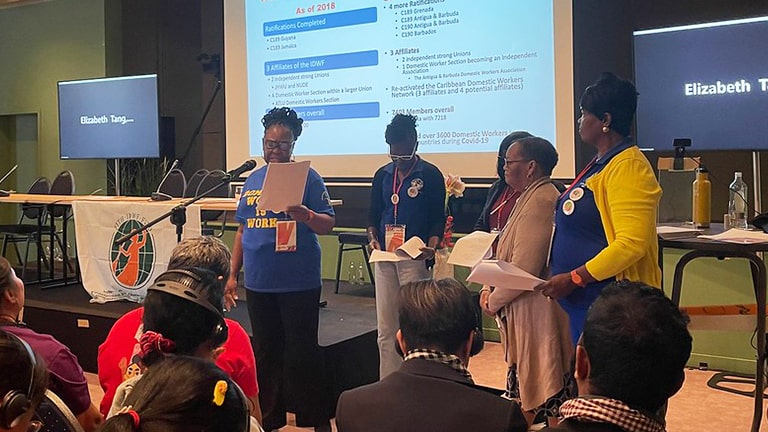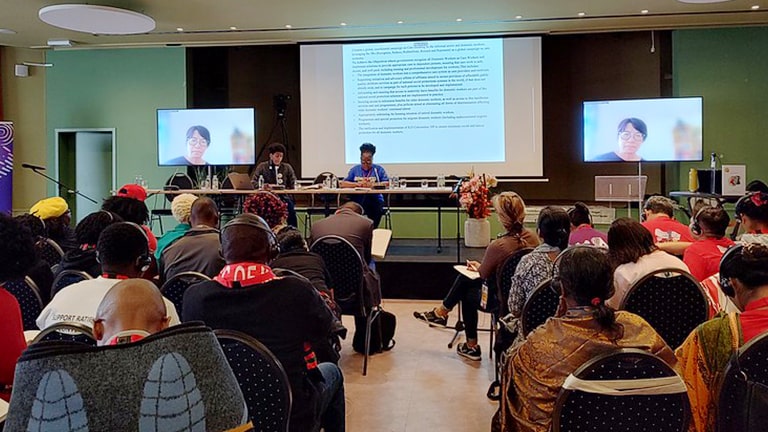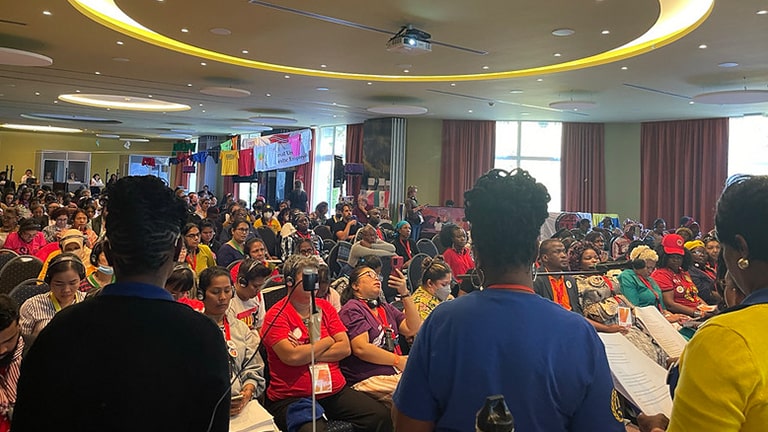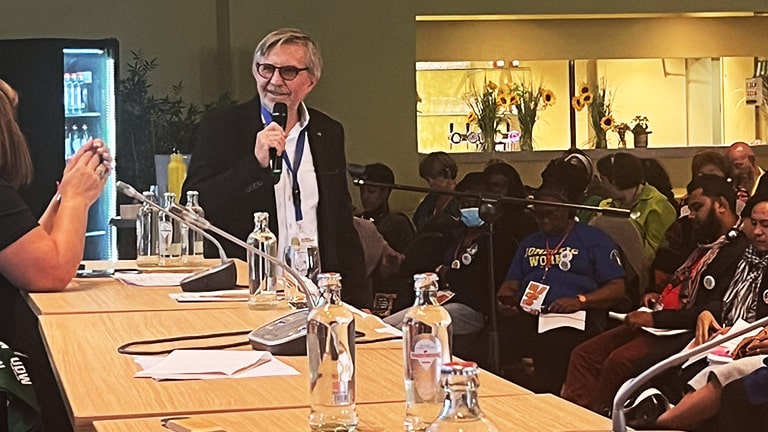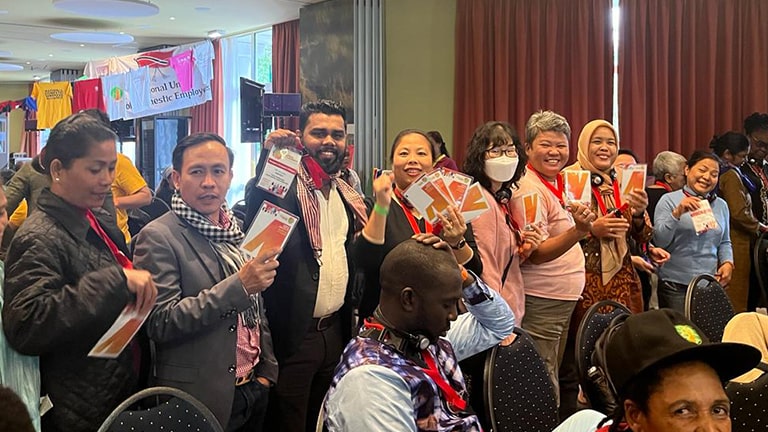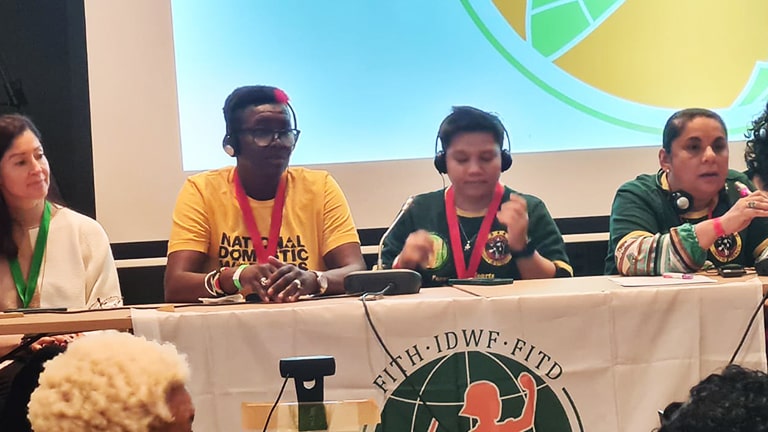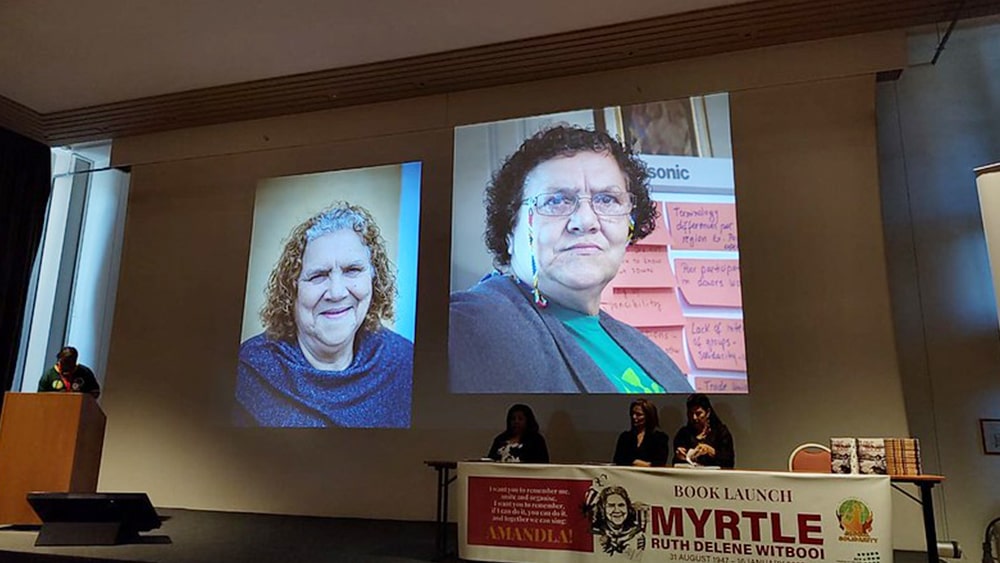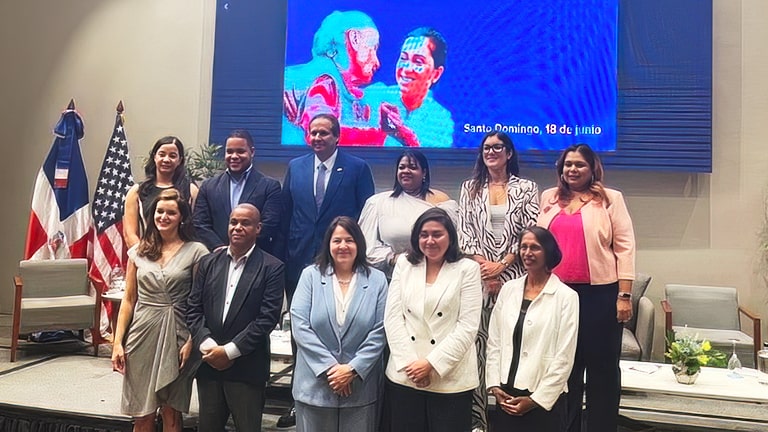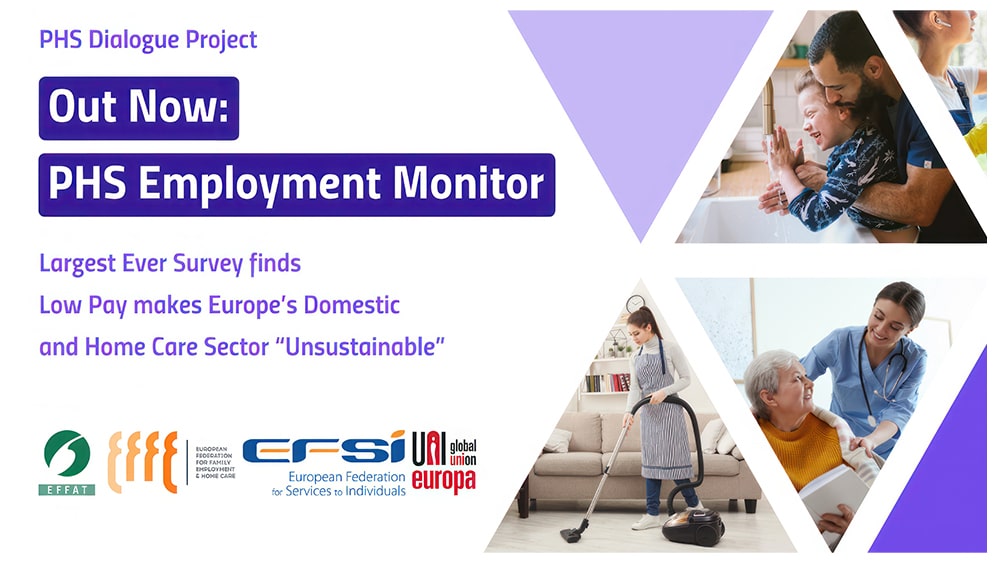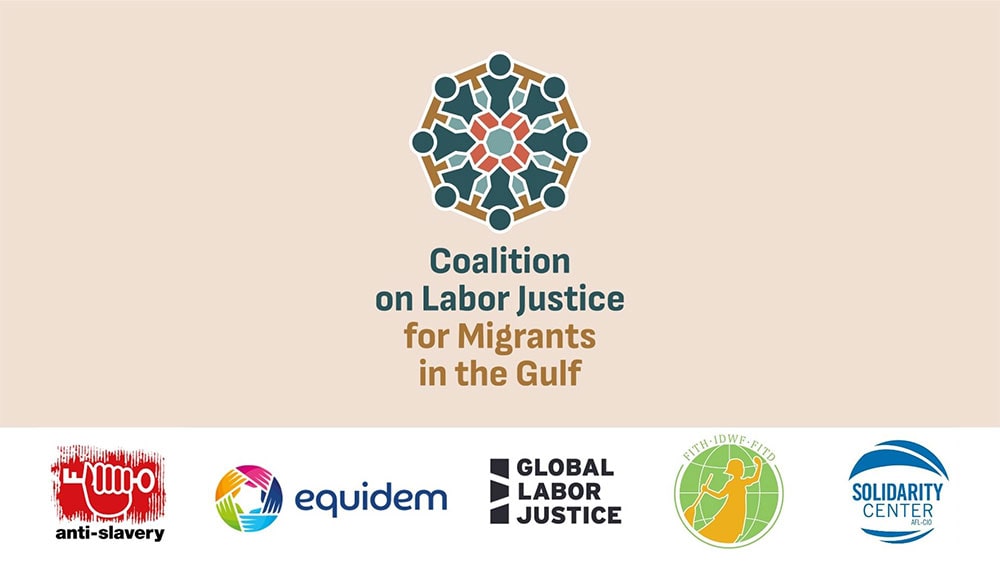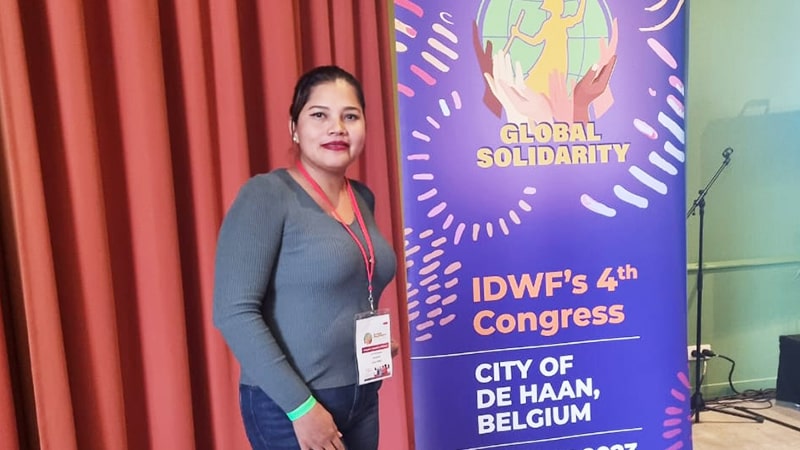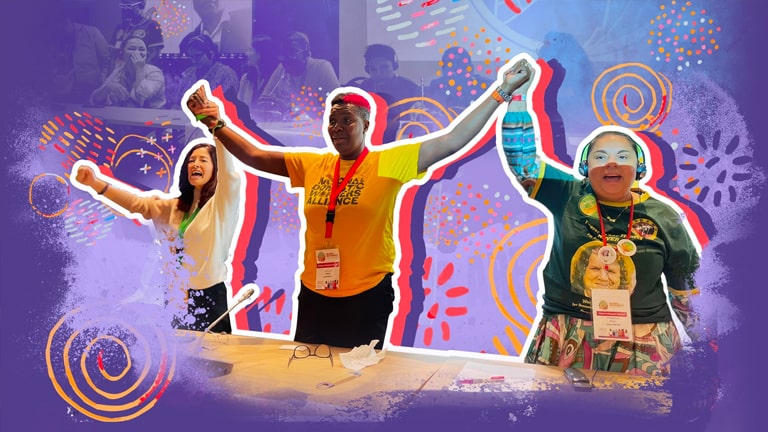
The IDWF fourth Congress was convened in De Haan, Belgium on the 2-5 October 2023. Almost 300 participants joined us amongst whom, there were delegates, observers, trade-unions, Labour NGOs, funders, and others.
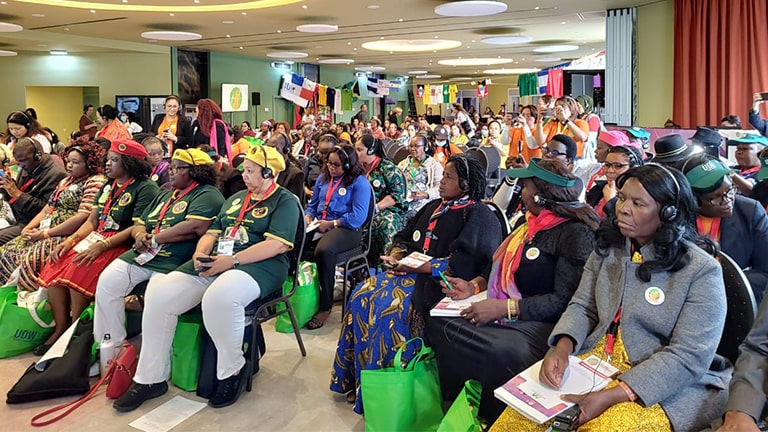
The congress started with the Master of Ceremony, Asmaou Bah, presenting the then-interim president of the IDWF and current elected president of the IDWF, Carmen Britez, to say a welcoming speech. Carmen welcomed the congress participants with the words that today is a momentous day: it is a day when many unions have reunited again after long years of a global pandemic which affected their work and the possibility of travel. Carmen reflected on the challenges and loss that befell our federation in the past year, as Myrtle Witbooi left us, and Elizabeth Tang was unable to travel and join us – but was present virtually throughout the entire congress. Carmen also reflected on the growth of the IDWF:
“We have grown, we have crossed borders, we achieved the ratifications of C189 and C190, we gained local, national, and regional laws. We used to be invisible, but we are visible now. And in this congress, we build bridges, in sisterhood and solidarity.”
After 5 years from the IDWF last congress, we renewed the commitment that our federation belongs to the domestic workers, it is by them and for them, and we honored our leaders who spend long hours working, negotiating, and leading us into a better future. One such instance was recognized, this year, as IDWF and its then general secretary, Elizabeth Tang, received the Arthur Svensson Award for trade unions. Shirley Pryce and Lita Anngraini who traveled for the occasion, presented the award to the congress.
Following the welcome address, the host organization representative, Pia Stalpaert, President of the ACV Food and Services, a founding member of the IDWF, gave her address. Pia Stalpaert spoke of her union’s past, present, and future commitment to the domestic workers’ movement and wished that this space they created for our congress can make us feel welcomed and valued, as it would be our home for the days of the Congress.
International guests spoke in the morning session. ITUC’s acting General Secretary, Luc Triangle, expressed congratulated IDWF for its many milestones, honored the movement’s resilience, and reflected on what it means for the hundreds of thousands domestic workers, indigenous and LGBTQI people, migrants, former child workers, etc. He expressed ITUC’s commitment to walk along with us in this path to build on the historic adoption of C189 and its recommendation 201. He also listed the gaps experienced in our sector, being a feminized one where women represent 76% of the workers, and the informality of the employment reaches 80%, which exacerbates the systematic forms of abused and violence against women. Against this backdrop, the ITUC proposed a new social contract in Melbourne, rooted in a gender-transformative agenda; decent work for Domestic workers, including migrants, in cooperation with IDWF. The ITUC also expressed its eagerness to work on the care economy agenda with our movement.
Next, Jane Barrett, WIEGO, has spoken on behalf of Sally Roever, WIEGO International Coordinator, expressing the pride the organization feels to see a strong IDWF. She addressed the room to ask how many of the domestic workers have employment contracts. A few responded. Jane wished us that in the next 10 years the room full of domestic workers will respond that they now have contracts, social security, and pension, and this is something we will not be silent about until all our demands are met. Jane encouraged solidarity with other workers who don’t have rights, including self-employed workers, street vendors, waste pickers, home based workers, so our movements can flourish together.
Then, Kristjan Bragason, the General Secretary of IUF-Europe, spoke on the profound importance of IUF’s partnership with IDWF. In 2008, when the International Domestic Workers Movement was born, we did the groundwork of what would be come the voice of domestic workers. We will continue building on the work towards the significant and absolute achievement of the ratification of C180 and its implementations in all countries. Kristjan referred to the House of Dignity, a campaign to raise awareness for domestic workers rights until they have what they rightfully deserve. He thanked Elizabeth Tang for her excellent cooperation on the achievement she and her team delivered: “These moments of unity and collaboration inspire us,” he said.
We concluded guest speeches by a video Addresses from the Minister Hilde Crevits, the Flemish Minister for Economy, Employment, Social Economy (and Agriculture), who expressed her and her country’s commitment to workers’ rights.
Carmen Britez gave her remarks of appreciation and announced the congress open!
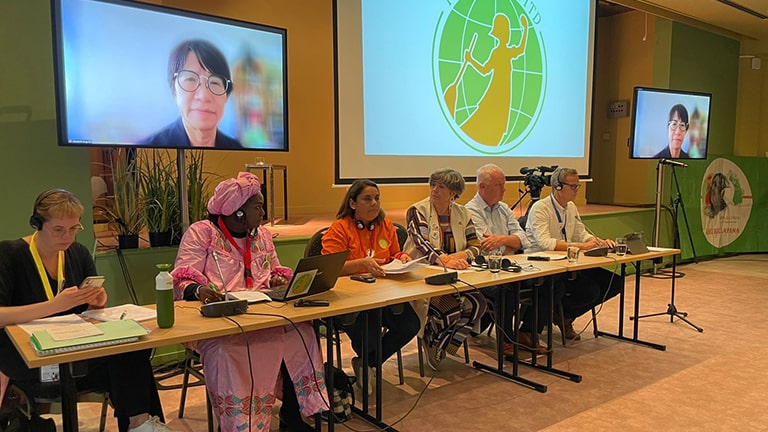
Tribute
The next session was full of emotion. Each region read the names of the leaders who passed before us, telling the congress their stories. Our leaders have been fighting for workers’ rights until their very last breath, showcasing the sacrifices they have made.
Jacqui Micheals, the daughter of our founding mother and first president Myrtle Witbooi, spoke about her mother. Myrtle fought her battle with cancer as much as she could, she wanted to say goodbye to all of us. She thought about the workers always, and on the last day of her life, she told Jacqui “Buy bread, butter, cheese, and coffee for the workers.” She wanted the movement to carry on and persevere, and this is exactly what we will do. Jacqui concluded “it is our mother, OUR mother, not mine.” The congress played a goodbye message from Myrtle that she has recorded to be shown at the occasion, and she told us to be a lighthouse.
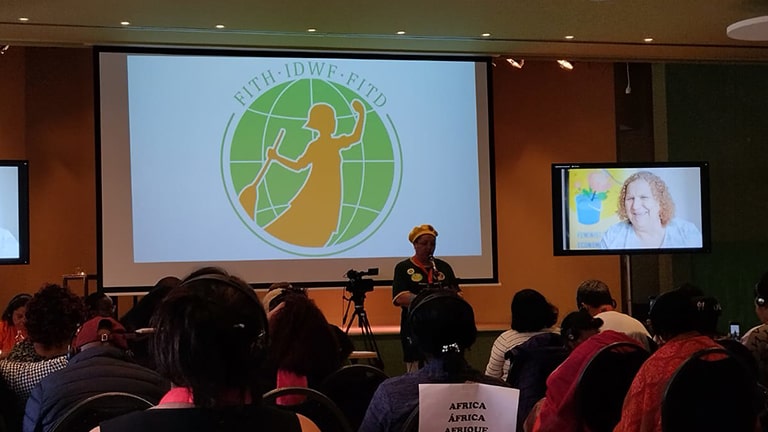
Introducing the participants and adopting the credentials
After a minute of silence, the congress moved to introducing the countries present from all the IDWF regions. Roula Seghaier, IDWF Strategic Program Coordinator, presented the participants and allies in the conference room. Each region ended its presentation by a regional chant, and all regions came together in song at the end of the presentation. During this session, we also showed a surprise video from our affiliate in Togo, who composed and sang hymn to the IDWF, thanking its mission to unite domestic workers.
The session concluded with the presentation from the credentials committee and the sharing of the principles adopted for the congress, such as equal speaking opportunity because we believe in democracy, limited interruption only in urgent situation, 3 minutes per speaker in speaking time, and one motion at a time to ensure a focused discussion. Our affiliates were excited to partake in the election and wanted a foothold in different processes, so they proposed that each region adds a member to the Election Committee, which was agreed by congress at the end of the 1st day.
Impact and Financial Report
In the afternoon, session, then-General Secretary, Elizabeth Tang, presented the financial report. The highlights include the following:
- 21 affiliates have joined since 2018 (30%) increase in membership since 2018.
- 94% of affiliates have improved their membership fees payment.
- The budget increased from 1.6 million dollars in 2018 to 5 million dollars this year.
- A solidarity fund for DWs was established.
C189 ratification and implementation campaigns
The day included an important Panel on Care Work and C189. It was chaired by Shirley Pryce and Adriana Paz Ramirez. The panel addressed that care is broadly defined as work and relationships that are necessary for the health, welfare, maintenance and protection of all–young, the old, disabled, everyone. Care is a basic need and right that sustains life. There are 75.6 million paid DWs worldwide, which since slavery times fulfill the care needs globally. The chair explained that C189 is a powerful international instrument to create decent working conditions, to formalize domestic work using the 5 R’s–recognize, reduce, redistribute, reward, and represent.
The first panel included, Maria Elena Valenzuela, a gender expert and DW expert, a technical adviser and consultant, who addressed that women are culturally perceived as “care-givers” which influences the devaluing of care. She addressed that it is nonetheless a profession, and that domestic workers become more and more specialized doing domestic work. The boundary from Maria’s point of view in the distinction is the medical specialization. There’s a higher responsibility by domestic workers of the people they take care of. The second panel was moderated by Claire Hobden of the ILO, who discussed with the speakers the following questions:
- who in your region deliver care work and do Domestic Workerss see themselves as care workers in your region?
- Are policies recognizing Domestic Workers and inclusive to Domestic Workers?
- What has your organization been doing to engage in care discussion and advocacy?
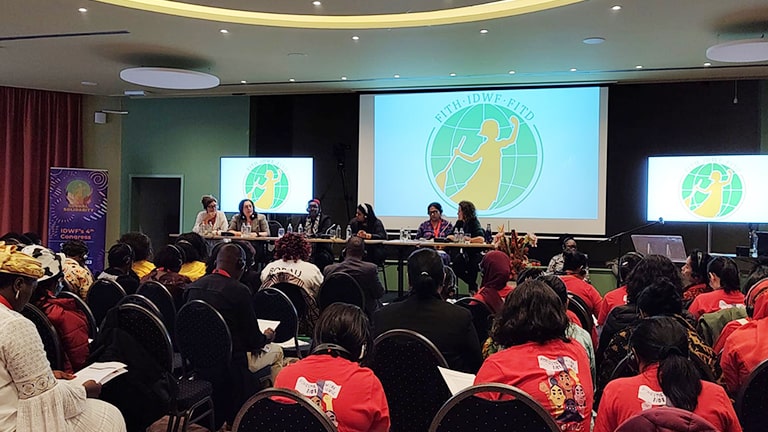
The panelists offered interesting insights. From Asia, Sonia George spoke about the care policy mapping produced in 8 countries in Asia. Wages of domestic workers are at a very low level and incomparable to other care workers’ wages, as domestic workers work inside their families and their work outside is considered as an extension of that work. Skilling towards rights is one of the slogans of our campaigns. DWs are skilled workers. Trade unions need to conduct training to help valorize and showcase domestic workers as professionals. We campaign for fair minimum wage and social protections. From Latin America, Ruth Diaz discussed the campaigns against machismo, advocating for maternity rights, etc. She explained “domestic workers are part of the discussions, even when not invited, we go because it’s our space. The productive sphere depends on us so we must be present on all these spaces.” June Barret, from North America, criticized how this this discussion is only taking place in the academic world. Domestic workers are care workers and they hold the whole society together, but unrecognized. In the US, domestic workers have been building alliances including ones on care demanding recognition, better work conditions and wages. They will continue to fight the government to be recognized, respected and paid fairly. Finally, Emanuella Loretone from Europe, spoke of the impact of the COVID-19 pandemic on domestic workers, as they were not sufficiently and equally protected. It’s difficult to monitor and inspect work conditions in houses in Europe. Domestic workers were given skills certifications in order to be paid well.
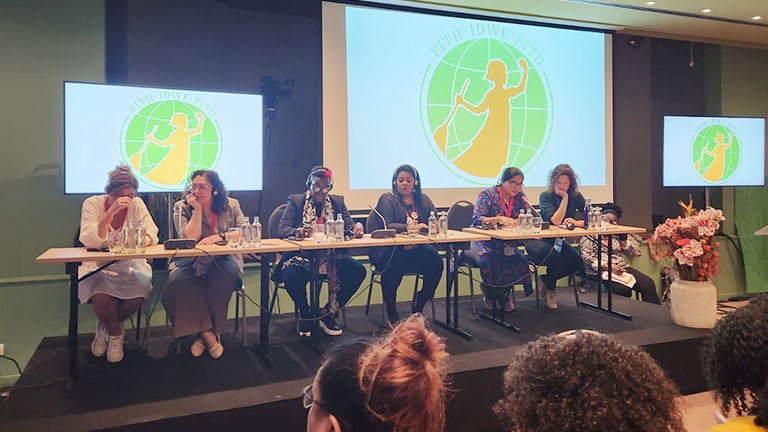
The third and last panel addressed the approaching ILC2024 and its main theme: care work. It reflected on the main advocacy goals of our allies. Chidi King described the disconnection between what care we provide in our daily personal life and domestic work done for other families. She reflected on the gain that the 29th of October is now officially recognized by the UN, which is a result of DWs advocacy efforts. The ILO decided there should be a general discussion on decent work, nurses and domestic workers, recognizing DWs as workers in the care economy. She included that investment in care, not only the vital infrastructure and services, but also investing in decent work and wages is of utmost importance. Adam Rogalewski of Public Service International (PSI) also reflected on how COVID-19 was a reifying gent: some workers are essential workers. Covid showed us that care is not a commodity. Given that there is a growing need for care, a lot of people getting older, Europe is very old, also AI will take some jobs over, for instance banking sector. However, care work, the work of domestic workers, will never be taken over by AI, because domestic workers care for people. Then, Mark Bergfield of UNICARE discussed the care-drain, how the richest countries from the global north are recruiting workers from the poorest countries in the global south. No decent work conditions for these workers. DWs have the right to decent work jobs in their home country and they should have the right to choose where to work and live. Government and public services are unable to improve institutional care so domestic workers are running an entire economy.
The panel concluded on the need to mobilize domestic workers, and that domestic workers are care workers. And of course, without further ado, the Composite/Combined Resolution on Care, Occupational Safety and Health Livelihood & Economic Empowerment was adopted by Congress.
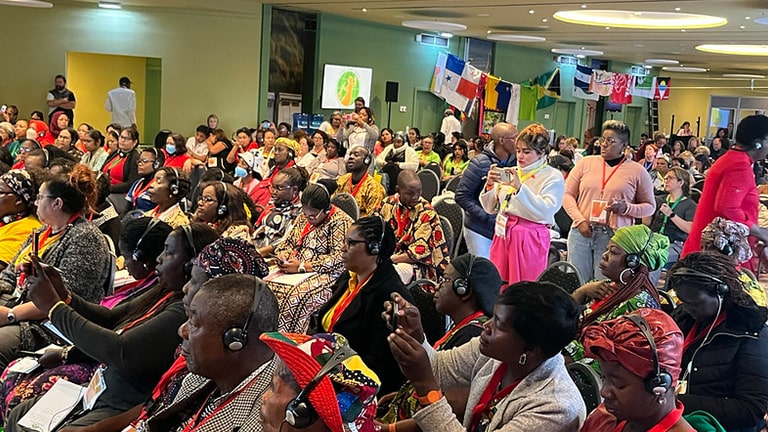
The congress proceeded to discuss the inclusion of the MENA region in the Executive Committee of the IDWF, and the emergency amendment was passed.
Finally, our Executive committee members were adopted by congress:
Asia Region:
- titular member: Sonia George.
- alternate Elma Sernande (Jec)
Africa Region:
- titular member is Toindepi Dhure
- alternate is Aissata Sadjo
Caribbean Region:
- titular member is Elaine Duncan
- alternate is Ida Le Blanc
European Region:
- titular member is Pia Stalpaert
- alternate is Emanuela Loretone
Latin American Region:
- titular member is Carmen Britez
- alternate is Ruth Diaz
North American Region:
- titular member is June Barrett
- alternate is Doug Moore
==> Doug Moore declined the position of a titular member in favor of June Barrett, and accepted the alternate position instead.
And finally,
MENA Region:
- titular member is Mary Ann Abunda
- alternate is Mercy Muteti
The day concluded by nominations of the Office bearers. Who was nominated?
You can watch the recap here:
The day started with regional presentations from Asia, Africa, Latin America, and the Caribbean reflecting major wins and challenges in the region. Affiliates employed creative methods to showcase their work, ranging from skits, drawings, poems, chants, and dances.
Multiple resolutions were adopted ranging from topics on social protection, operational health and safety, solidarity in light of the rise of authoritarianism, gender inclusivity and the representativity of the LGBTQI community at IDWF, to list a few.
A roundtable was held, titled Workers Overcoming Informality: Issues and Strategies. Our sister networks from WIEGO, StreetNet, HomeNet, and the International Alliance of Waste-Pickers shared their insights and elaborated analogies with the domestic work sector as well as provided us with tactics and first-hand experiences in combating informality. There is nothing more powerful than the tips and tricks from sister movements for our membership to be inspired and build its global solidarity, across borders and across movements.
The day continued with a message fro FES MENA Director- Helmut Elischer. He spoke of the leader whose name now serves as the name of the organization. He was the first democratically elected president when the Germans started a people’s revolution. He stipulated that there should be a foundation to support the workers movement. “We nurture and work to keep social trade union alive to fight for justice and solidarity.” Helmut expressed the vision of FES, speaking to the fact that 10% of the people own 90% of the resources, and that there is “No democracy without democrats.” He congratulated the congress and looked forward toward the enactment of democracy.
After the session, Sue Longley, representing IUF, a founding partner of the IDWF, spoke of her unions support to IDWF:
“We know from our experience that this is one of the hardest sectors to organize.”
The IUF has seen the exclusion the workers suffer in labor laws and the lack of protection. The difference with our sector is that we are organized in private households which poses additional layers risks and challenges. The IDWF is an inspiration to the global labor movement about the sort of changes we need to make to be fit for purpose as the world of work changes. IDWF’s knowledge is instrumental in outreach to women workers to bringing them into our unions. Women often suffer from discrimination in trade-unions too, for instance, in senior levels of union leadership. The IDWF is therefore a unique and important space for women’s effective leadership. The IUF expressed its pride to have self-employed women’s association in their membership, including SEWA, IDWF’s affiliate.
So together, our unions can move towards more inclusivity, visibility, and growth.
The day concluded with Speeches from the uncontested presidential nominee, second vice president, and secretary general, as well as the two nominees for 1st Vice President.
President’s presentation: Carmen Britez
“I want to underpin my commitment to continue working for the unity of this federation, the rights of DWs and for the 670,000 workers of IDWF. To work for MDWs and Care workers, and follow what Myrtle said: she will always be next to us to have our rights recognized. After this congress all of us will work as a team. The power for the sake of power should not exist, we have to work together for this federation.”
Nominee for 1st VP: Sonia George, SEWA
“When I joined as a trade unionist, I took on a challenge to organize and stand up for DWs. I started my union work with SEWA 25 years ago, and the fight we have been going through is to gain recognition in India, and I have been working closely with our leaders to organize DWs. We have constituted a national platform bringing more than 30 organizations. We have to fight for DWs and comprehensive law. It is important for us to have representation in the global federation for the most vulnerable women.”
Nominee for 1st VP: Toindepi Dhure, ZDAWU
Sharing a common goal to make a difference in our lives as DWs. It is our duty to implement and identify sustainable solutions. I am committed to create an environment of inclusivity where every voice is valued. I advocate for the continued pursuit of innovation. We can drive transformative change through education and training, MDWs support, organizing, and campaigning for ratification of C189 and 190.
Nominee the 2nd VP: June Barrett
“Thank you for your support. I am extremely humbled to represent all regions, and would like to recognize the comrades who were denied from the visa- this should never happen again. I will be taking my vision of all DWs. Together with my incoming EXCO and GS we will work to strengthen and unite the federation. The first nomination was from a Gen Z generation. I am here to work and fight and unify all of us.”
General Secretary: Adriana Paz:
“I am Adriana, born and raised in Bolivia in dictatorship times, which shaped my understanding of sovereignty and autonomy. Democracy, even if not perfect, is what we should aspire to for justice. It requires us to put aside our differences in the pursuit of freedom, justice, and equality. I’ve spent the rest of my activism life mostly in Canada with migrant farm workers and enforced my activism with MDWs and care workers. I fell in love with this powerful movement. Creating IDWF was a dream that many said won’t be possible but you proved that it is. IDWF needs to keep building processes for inclusion. I am honored to receive the nomination from 54 affiliates globally, thank you for this opportunity and for your trust.”
The day concluded by preparation for the election on the next day.
Day 4 was the final day of congress, with our delegates preparing for the vote and casting their ballots.
They sang:
“On your marks, get set
We are ready to cast our vote”
The election results were in making Toindepi Dhure the 1st Vice President of the IDWF. The now complete Executive Board including our office bearers have now been adopted by Congress.
IDWF President, Carmen Britez, addressed the congress:
“Let’s continue to work together. Our responsibility is to work together, work for the domestic workers. So dear colleagues, we would like to reassert that just like the previous ExCo worked hard to ensure this process and that this growth was possible, this new ExCo and these new vice presidents and general secretary will work for our unity. You are the ones who own this federation. And we must never forget what our mother Myrtle taught us, she is our mother and will always accompany us along this path.”
The General Secretary, Adriana Paz Ramirez, concluded the speeches with her address:
“Yesterday I said that domestic workers organizing has a hundred years already. It was started by our ancestors, organizers, the ones that started in their own regions, they also went through immense challenges. They knew that they were bringing together different experiences and points of view, and priorities, yet they knew that they had a common goal, a common vision, the vision for justice and dignity. They said let’s do this despite the challenges, domestic worker organizing is bigger than us.”
In the afternoon, our participants visited the historic city of Bruges in various activities, and concluded their excursion at the historic hospital, where the launch of Myrtle Witbooi’s biography took place.
It was a congress full of emotions and learnings, which was mounted on the incessant labor of our members and colleagues. It marked the 10th anniversary of IDWF as a federation. None of this would have been possible without our leaders, our allies, our partners, those who believe that domestic workers of the world shall unite!
Watch the overview episode of our Congress here.

